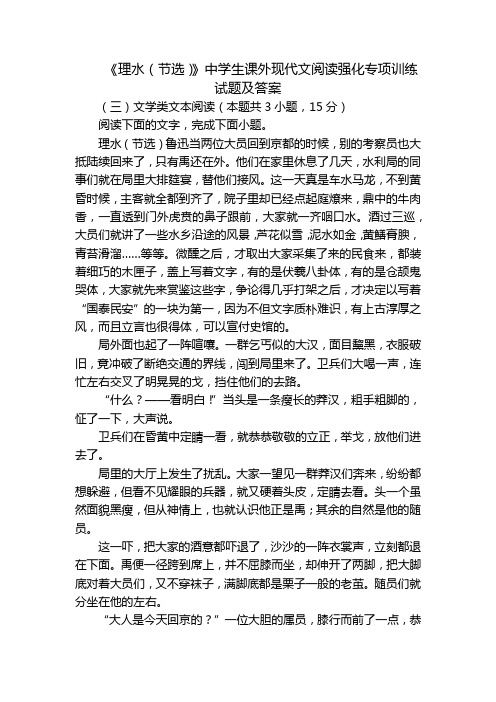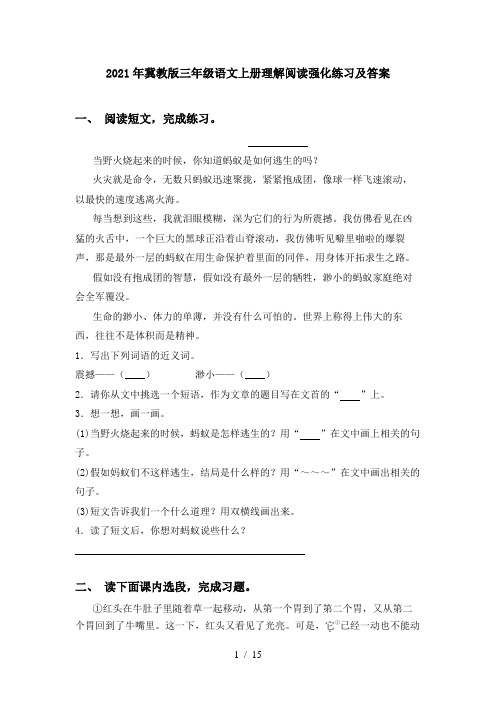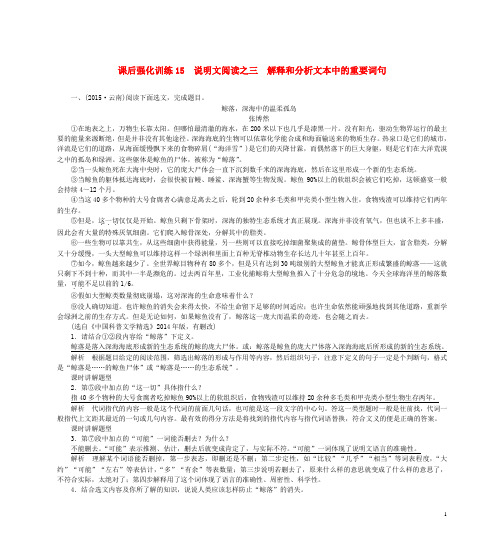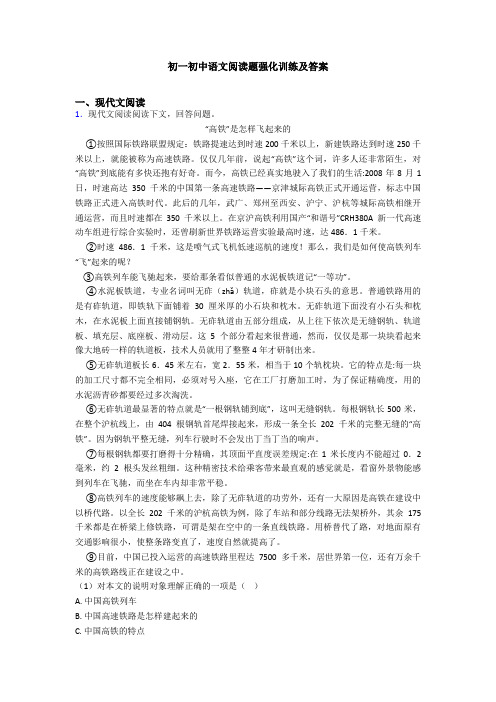阅读理解题强化训练(三)
《理水(节选)》中学生课外现代文阅读强化专项训练试题及答案

《理水(节选)》中学生课外现代文阅读强化专项训练试题及答案(三)文学类文本阅读(本题共3小题,15分)阅读下面的文字,完成下面小题。
理水(节选)鲁迅当两位大员回到京都的时候,别的考察员也大抵陆续回来了,只有禹还在外。
他们在家里休息了几天,水利局的同事们就在局里大排筵宴,替他们接风。
这一天真是车水马龙,不到黄昏时候,主客就全都到齐了,院子里却已经点起庭燎来,鼎中的牛肉香,一直透到门外虎贲的鼻子跟前,大家就一齐咽口水。
酒过三巡,大员们就讲了一些水乡沿途的风景,芦花似雪,泥水如金,黄鳝膏腴,青苔滑溜……等等。
微醺之后,才取出大家采集了来的民食来,都装着细巧的木匣子,盖上写着文字,有的是伏羲八卦体,有的是仓颉鬼哭体,大家就先来赏鉴这些字,争论得几乎打架之后,才决定以写着“国泰民安”的一块为第一,因为不但文字质朴难识,有上古淳厚之风,而且立言也很得体,可以宣付史馆的。
局外面也起了一阵喧嚷。
一群乞丐似的大汉,面目黧黑,衣服破旧,竟冲破了断绝交通的界线,闯到局里来了。
卫兵们大喝一声,连忙左右交叉了明晃晃的戈,挡住他们的去路。
“什么?——看明白!”当头是一条瘦长的莽汉,粗手粗脚的,怔了一下,大声说。
卫兵们在昏黄中定睛一看,就恭恭敬敬的立正,举戈,放他们进去了。
局里的大厅上发生了扰乱。
大家一望见一群莽汉们奔来,纷纷都想躲避,但看不见耀眼的兵器,就又硬着头皮,定睛去看。
头一个虽然面貌黑瘦,但从神情上,也就认识他正是禹;其余的自然是他的随员。
这一吓,把大家的酒意都吓退了,沙沙的一阵衣裳声,立刻都退在下面。
禹便一径跨到席上,并不屈膝而坐,却伸开了两脚,把大脚底对着大员们,又不穿袜子,满脚底都是栗子一般的老茧。
随员们就分坐在他的左右。
“大人是今天回京的?”一位大胆的属员,膝行而前了一点,恭敬的问。
“你们坐近一点来!”禹不答他的询问,只对大家说。
“查的怎么样?”大员们一面膝行而前,一面面面相觑,列坐在残筵的下面,看见咬过的松皮饼和啃光的牛骨头。
人教版八年级英语上册期末复习专题训练三、阅读理解解题技巧及训练(含答案)

2019-2020人教版八年级英语上册期末复习专题训练三、阅读理解解题技巧及训练(含答案)一、阅读理解题型分类:1、文章主旨大意或段落大意题。
常见提问方式:(1)What is the best title of the passage?(2)What does the passage want to tell us?(3)What’s this passage mainly about?2、划线部分猜测和生词词义猜测题。
常见提问方式:(1)What does the underline word " " in Paragraph 1 mean?(2)What does the underlined word “It” refer to?3、细节事实细节题。
常见提问方式:(1)On his way home, John forgot ______.(2)Why did Jamie say "It's no use!"?(3)Jay Chou’s mother worked in a _______.(4)What happened after Beethoven became deaf?4、作者意图推理和判断题。
常见提问方式:(1)Which of the statements(陈述)is right?(2)What is TRUE about all kinds of energy in the passage? (3)Which is NOT the writer’s advice?(4)Why did the writer write the passage?5、文章来源和逻辑顺序。
常见提问方式:(1)What is the RIGHT order (顺序)of the following according to the passage? (2)Where can we read this passage ?6、生活常识和文化背景题。
2021年冀教版三年级语文上册理解阅读强化练习及答案

2021年冀教版三年级语文上册理解阅读强化练习及答案一、阅读短文,完成练习。
当野火烧起来的时候,你知道蚂蚁是如何逃生的吗?火灾就是命令,无数只蚂蚁迅速聚拢,紧紧抱成团,像球一样飞速滚动,以最快的速度逃离火海。
每当想到这些,我就泪眼模糊,深为它们的行为所震撼。
我仿佛看见在凶猛的火舌中,一个巨大的黑球正沿着山脊滚动,我仿佛听见噼里啪啦的爆裂声,那是最外一层的蚂蚁在用生命保护着里面的同伴,用身体开拓求生之路。
假如没有抱成团的智慧,假如没有最外一层的牺牲,渺小的蚂蚁家庭绝对会全军覆没。
生命的渺小、体力的单薄,并没有什么可怕的。
世界上称得上伟大的东西,往往不是体积而是精神。
1.写出下列词语的近义词。
震撼——(____)渺小——(____)2.请你从文中挑选一个短语,作为文章的题目写在文首的“”上。
3.想一想,画一画。
(1)当野火烧起来的时候,蚂蚁是怎样逃生的?用“”在文中画上相关的句子。
(2)假如妈蚁们不这样逃生,结局是什么样的?用“~~~”在文中画出相关的句子。
(3)短文告诉我们一个什么道理?用双横线画出来。
4.读了短文后,你想对蚂蚁说些什么?______________________________________________二、读下面课内选段,完成习题。
①红头在牛肚子里随着草一起移动,从第一个胃到了第二个胃,又从第二个胃回到了牛嘴里。
这一下,红头又看见了光亮。
可是,它.①已经一动也不能动了。
②这时,青头爬到牛鼻子上,用它.②的身体在牛鼻孔里蹭来蹭去。
③“阿嚏!”牛打了一个喷嚏,红头随着一团草一下子给喷了出来。
④红头看见自己的朋友,高兴得流下了眼泪:“谢谢你……”⑤青头笑眯(mī)眯地说:“不要哭,就算你在牛肚子里作了一次旅行吧!”1.文段中两个加点的“它”分别指谁?“它”①:_________________ “它”②:_________________2.第①段中,红头在牛肚子里经过了哪些地方?请填一填。
课外阅读理解强化训练

课外阅读理解强化训练一、阅读短文,回答问题。
猴子建筑师猴子自称曾经向著名的建筑师学过技艺,在森林里就以建筑师自居。
猴子来到树下,看到喜鹊正在搭窝,它歪着头看了看,不由勃然大怒:“停下,停下,你这个笨蛋!巢口能朝上吗?应朝下,只有这样才能遮雨,懂了吗?”喜鹊愣住了。
猴子叨念着:“笨蛋。
”摇摇头,背着手走了。
猴子走到山坡下,看见兔子正在兴致勃勃地打洞,它歪着头看了看,不由叹了一口气:“唉,你的胆子太小了!挖这样小的洞,你只想到安全,万一你站着出来怎么办?应该挖大点,要有长远考虑,懂了吗?”兔子蹲在那儿,迷惑地眨着眼睛。
猴子唠叨着:“短浅。
”摇着头,背着手走开了。
暴风雨来了,喜鹊进了窝,兔子钻进洞,只有猴子窜进树林,双手抱头缩在一棵大树下,任凭风吹雨打。
1.照样子,组词。
自称自居自()自()自()自()2.喜鹊搭窝、兔子打洞,猴子分别给了什么建议?3.你认为猴子的建议有道理吗?为什么?4. 猴子分别用“笨蛋”和“短浅”来评价喜鹊和兔子,如果让你来评价猴子,你会用哪个词语呢?_____________________________________________________________二、看新闻回答问题。
1.房子的主人是__________________,“借宿者”是___________________。
2.这群燕子与这一家人同住了_____年。
如今,仅他家客厅里就有_____个成型的燕子窝和_____个正在加盖中的燕子窝。
燕子们飞进飞出,叽叽喳喳,甚至弄坏了家中的墙壁,但这一家人_________________________。
3.读了这则新闻,你有什么启发?______________________________________________________________________________________________________________________________________ ______________________。
2015中考语文 课后强化训练 15 说明文阅读之三 解释和分析文本中的重要词句(含解析)

课后强化训练15 说明文阅读之三解释和分析文本中的重要词句一、(2015·云南)阅读下面选文,完成题目。
鲸落,深海中的温柔孤岛张博然①在地表之上,万物生长靠太阳。
但哪怕最清澈的海水,在200米以下也几乎是漆黑一片。
没有阳光,驱动生物界运行的最主要的能量来源断绝,但是并非没有其他途径。
深海海底的生物可以依靠化学能合成和海面输送来的物质生存。
热泉口是它们的城市,洋流是它们的道路,从海面缓慢飘下来的食物碎屑(“海洋雪”)是它们的天降甘霖,而偶然落下的巨大身躯,则是它们在大洋荒漠之中的孤岛和绿洲。
这些躯体是鲸鱼的尸体,被称为“鲸落”。
②当一头鲸鱼死在大海中央时,它的庞大尸体会一直下沉到数千米的深海海底,然后在这里形成一个新的生态系统。
③当鲸鱼的躯体抵达海底时,会很快被盲鳗、睡鲨、深海蟹等生物发现。
鲸鱼90%以上的软组织会被它们吃掉,这顿盛宴一般会持续4~12个月。
④当这40多个物种的大号食腐者心满意足离去之后,轮到20余种多毛类和甲壳类小型生物入住,食物残渣可以维持它们两年的生存。
⑤但是,这一切...仅仅是开始。
鲸鱼只剩下骨架时,深海的独特生态系统才真正展现。
深海并非没有氧气,但也谈不上多丰盛,因此会有大量的特殊厌氧细菌。
它们爬入鲸骨深处,分解其中的脂类。
⑥一些生物可以靠共生,从这些细菌中获得能量,另一些则可以直接吃掉细菌聚集成的菌垫。
鲸骨体型巨大,富含脂类,分解又十分缓慢,一头大型鲸鱼可以维持这样一个绿洲和里面上百种无脊椎动物生存长达几十年甚至上百年。
⑦如今,鲸鱼越来越少了。
全世界鲸目物种有80多个,但是只有达到30吨级别的大型鲸鱼才能真正形成繁盛的鲸落——这就只剩下不到十种,而其中一半是濒危的。
过去两百年里,工业化捕鲸将大型鲸鱼推入了十分危急的境地。
今天全球海洋里的鲸落数量,可能..不足以前的1/6。
⑧假如大型鲸类数量彻底崩塌,这对深海的生命意味着什么?⑨没人确切知道。
也许鲸鱼的消失会来得太快,不给生命留下足够的时间适应;也许生命依然能顽强地找到其他道路,重新学会绿洲之前的生存方式。
苏教版六年级上学期小学语文强化训练练习三单元真题模拟试卷(16套试卷)

苏教版六年级上学期小学语文强化训练练习三单元真题模拟试卷(16套试卷) 特别说明:本套试卷搜集了考点及专项复习练习知识点,内容详尽全面,仅供参考。
全套试卷共16卷苏教版六年级强化训练练习上学期小学语文三单元真题模拟试卷卷(①)苏教版强化训练练习六年级上学期小学语文三单元真题模拟试卷卷(①)苏教版六年级强化训练练习上学期小学语文三单元真题模拟试卷卷(②)苏教版强化训练练习六年级上学期小学语文三单元真题模拟试卷卷(②)苏教版六年级强化训练练习上学期小学语文三单元真题模拟试卷卷(③)苏教版强化训练练习六年级上学期小学语文三单元真题模拟试卷卷(③)苏教版六年级强化训练练习上学期小学语文三单元真题模拟试卷卷(④)苏教版强化训练练习六年级上学期小学语文三单元真题模拟试卷卷(④)苏教版六年级强化训练练习上学期小学语文三单元真题模拟试卷卷(一)苏教版强化训练练习六年级上学期小学语文三单元真题模拟试卷卷(一)苏教版六年级强化训练练习上学期小学语文三单元真题模拟试卷卷(三)苏教版强化训练练习六年级上学期小学语文三单元真题模拟试卷卷(三)苏教版六年级强化训练练习上学期小学语文三单元真题模拟试卷卷(二)苏教版强化训练练习六年级上学期小学语文三单元真题模拟试卷卷(二)苏教版六年级强化训练练习上学期小学语文三单元真题模拟试卷卷(四)苏教版强化训练练习六年级上学期小学语文三单元真题模拟试卷卷(四)苏教版六年级强化训练练习上学期小学语文三单元真题模拟试卷卷(①)时间:90分钟满分:100分一、基础练习(40分)1. 选择合适的字。
(垦恳)______切秘______(密蜜)(揽览)______入(起企)______盼(虚虔)______诚硬______(币巾)2. 选择划线字正确的读音。
缅怀______(miàn miǎn)陡峭______(qiào qiāo)寥落______(liào liáo)驯养______(xùn xún)3. 我是拼音小能手______ ______ ______咧嘴菩萨鼻涕4. 根据拼音写词语。
2020-2021学年牛津译林版八年级英语上册阅读理解专项强化训练(三)(含答案)

Day OneSong without sightIn 1798, German composer Ludwig van Beethoven marked the first passage of his newest composition (作曲) with the Italian term “grave”, meaning slow and solemn (肃穆的). He was troubled to learn that he was losing his hearing. But his Sonata Pathétique (《悲怆奏鸣曲》) sounded exciting and optimistic (积极的). It has inspired (激励) many people over the years.On Aug 29, 18-year-old Xiong Linghao from Chengdu Special Education School played the sonata at the 13th Shanghai International Youth Piano Competition. A video of her performance has gotten 7 million views online.It’s been a long and hard journey for Xiong. She lost her eyesight due to a medical accident when she was still a baby. Her mother later found that Xiong had a talent for music. At age 3, she could play children’s songs on a small electric (电子的) piano. At age 6, she started learning the piano for real.Unlike people who can see the keyboard (键盘), she must remember where each note is. Practice is key because she needs to form muscle memory (肌肉记忆) so she can find the right keys. She practices six to eight hours every day. “I listen to the melody (旋律) again and again and then send what I hear to my fingers. I used to practice with each hand separately before I could play with both hands together,” Xiong said.Xiong won the Special Jury Prize (评审团特别奖) at the competition. “The piano has accompanied (陪伴) me through my ups and downs in its own way,” she said. “It empowers me and brings so much pleasure (乐趣) into my life.”1. Xiong Linghao got attention online for _____.A. being a blind piano playerB. being a young piano playerC. her outstanding memoryD. her sad experience2. Paragraph 3 is written to show _____.A. how Xiong lost her eyesightB. how Xiong started to learn the pianoC. how Xiong practiced pianoD. how Xiong recovered from an accident3. From what Xiong said, we know that _____.A. she easily remembers where each key isB. she spends a lot of time practicing the pianoC. she gets bored with practicing only one melodyD. she can play any melody after listening to it4. Xiong’s exp erience is _____.A. dangerousB. excitingC. encouragingD. commonDay TwoTaking care of our outdoor workWhat kinds of chores do you usually do around the house? Maybe you clean your room, wash the dishes, sweep or mop (拖) the floor. All of these are “indoor” chores.But in many places – especially in rural (农村的) areas and suburbs (郊区) in the US – kids hav e different “outdoor” chores during differentseasons.In the fall, the most common outdoor chore is raking (清扫) leaves. As trees lose their leaves in fall, the leaves will pile up (堆积) in people’s yards. It is up to each family to rake up the leaves and put them in big trash bags.After a heavy snowfall in winter, children help shovel (铲) snow in their front yard. Otherwise (否则), it might be hard for families to leave their homes.Spring and summer bring lots of rain and sun, which make the grass in people’s yards grow tall. It is common for kids to mow (割草) their yards to keep them fresh and neat (整洁的).Doing all of these chores might sound like a lot of work. Fortunately (幸运的是), most families give their kids a little bit of money for doing them. People who don’t have children might even pay neighborhood kids to take care of chores for them. Either way, it’s a good way to make some money if you aren’t old enough to have a real job yet.1. In the US, the most common outdoor chore in fall is _____.A. mopping the floorB. walking dogsC. raking leavesD. mowing yards2. In winter, people shovel snow in their front yard because _____.A. they like to keep their yard clean and neatB. gr ass won’t grow if snow is on itC. it is a traditional winter outdoor activityD. the snow might block their way out3. What can we learn from the last paragraph?A. Doing outdoor chores is difficult.B. Kids can earn money by doing outdoor chores.C. People without kids find it hard to do chores.D. US parent s don’t want to do outdoor chores.4. The story is mainly about _____.A. ways of making money in the USB. different outdoor chores in the USC. differences between outdoor chores in China and the USD. why people in the US have yardsDay ThreeBe honest alwaysDuring the Eastern Han Dynasty (25-220), there was a government official (政府官员) named Yang Zhen.One day, Yang ran into his old coworker (同事) Wang Mi during a trip. In the past, Yang noticed Wang’s talent and promoted (提拔) him. Wang never forgot Yang’s help and invited Yang to stay over for the night.It was near midnight when Wang knocked on the door of Yang’s bedroom. He handed Yang a bag and said, “This is to thank you for teaching me and helping me become who I am today.” Yang looke d in the bag. It was full of gold ingots (金锭).“Do I look like a person who accepts (接受) bribes (贿赂)? I thought you knew me well!” Yang said angrily.“It’s late at night. No one will know if we keep it a secret,” said Wang.“What do you mean no one would know? Heaven (天) knows, Earth (地) knows, you know and I know,” Yang said.Wang left the room in shame (羞愧).1. Yang Zhen promoted Wang Mi because _____.A. he knew Wang was talentedB. he wanted to thank Wang for his helpC. Wang was his old coworkerD. Wang lived a poor life2. To thank Yang, Wang _____.A. treated Yang as his brotherB. went to bribe Yang secretlyC. gave Yang a new bagD. helped Yang keep secrets3. Why was Yang angry with Wang?A. Because Wang gave his secrets away.B. Because he found Wang wasn’t talented.C. Because he found Wang accepted bribes.D. Because Wang tried to bribe him.4. We might describe Yang as being _____.A. two-facedB. shamelessC. sillyD. justDay FourRobots in serviceA big fair just ended in Beijing. The China International Fair for Trade in Services (CIFTIS) took place from Sept 4 to 9. It is a major (主要的) service trade event. Visitors saw how new technologies, such as artificial intelligence and 5G, are used in different areas. One highlight (亮点) this year was service robots. Let’s look at three of them.Robot dogUnitree, a company in Hangzhou, Zhejiang, has made a robot dog.With an AI-powered smart camera, it can record everything it sees in real time. It can move up to 3.3 meters per second. It can also carry objects weighing up to 5 kg, about as heavy as 10 bottles of water.The robot dog can give people a hand in many ways. For example, it can move (搬运) goods or search for people who go missing during disasters (灾难).Garbage-sorting robotGarbage sorting is new to many people. Swiss company ABB has designed (设计) a robot to help us do it. It uses two arms to pick different kinds of garbage that come down a conveyor belt (传送带). It then throws the garbage into the right bin. A screen (屏幕) can show how many pieces of garbage it has sorted.Ping-pong serving robotCan you hit back a ball that is served (发) by a robot? Find out by playing against a ping-pong serving robot made by Chinese company Siasun. The robot can serve balls one by one automatically (自动地). It can change the speed, angle (角度), and landing area (落点) of the ball as well. It can record your performance with a camera so you can review it later. It will help ping-pong players train (训练) and improve.Fill in the blanks:A quick look of CIFTIS• It took place from 1. _____ to ______.• Visitors can see how 2. _____ are used in different service areas. Robot dogCompany: UnitreeUsage: helping people do tasksAbility:• record in real time• run fast• car ry 3. _____• 4. _____ during disastersPing-pong serving robotCompany: SiasunUsage: 5. _____ ping-pong playersAbility:• 6. _____ one by one automatically• change the speed, angle, and landing area of the ball• record players’ 7. _____Garbage-sorting robotCompany: ABBUsage: 8. _____Ability:• 9. _____ from a conveyor belt• 10. _____ into the right bin• count how many pieces of garbage are sortedDay Five根据首字母提示补全短文。
初一初中语文阅读题强化训练及答案

初一初中语文阅读题强化训练及答案一、现代文阅读1.现代文阅读阅读下文,回答问题。
“高铁”是怎样飞起来的①按照国际铁路联盟规定:铁路提速达到时速200千米以上,新建铁路达到时速250千米以上,就能被称为高速铁路。
仅仅几年前,说起“高铁”这个词,许多人还非常陌生,对“高铁”到底能有多快还抱有好奇。
而今,高铁已经真实地驶入了我们的生活:2008年8月1日,时速高达350千米的中国第一条高速铁路——京津城际高铁正式开通运营,标志中国铁路正式进入高铁时代。
此后的几年,武广、郑州至西安、沪宁、沪杭等城际高铁相继开通运营,而且时速都在350千米以上。
在京沪高铁利用国产“和谐号”CRH380A新一代高速动车组进行综合实验时,还曾刷新世界铁路运营实验最高时速,达486.1千米。
②时速486.1千米,这是喷气式飞机低速巡航的速度!那么,我们是如何使高铁列车“飞”起来的呢?③高铁列车能飞驰起来,要给那条看似普通的水泥板铁道记“一等功”。
④水泥板铁道,专业名词叫无砟(zhǎ)轨道,砟就是小块石头的意思。
普通铁路用的是有砟轨道,即铁轨下面铺着30厘米厚的小石块和枕木。
无砟轨道下面没有小石头和枕木,在水泥板上面直接铺钢轨。
无砟轨道由五部分组成,从上往下依次是无缝钢轨、轨道板、填充层、底座板、滑动层。
这5个部分看起来很普通,然而,仅仅是那一块块看起来像大地砖一样的轨道板,技术人员就用了整整4年才研制出来。
⑤无砟轨道板长6.45米左右,宽2.55米,相当于10个轨枕块。
它的特点是:每一块的加工尺寸都不完全相同,必须对号入座,它在工厂打磨加工时,为了保证精确度,用的水泥沥青砂都要经过多次淘洗。
⑥无砟轨道最显著的特点就是“一根钢轨铺到底”,这叫无缝钢轨。
每根钢轨长500米,在整个沪杭线上,由404根钢轨首尾焊接起来,形成一条全长202千米的完整无缝的“高铁”。
因为钢轨平整无缝,列车行驶时不会发出丁当丁当的响声。
⑦每根钢轨都要打磨得十分精确,其顶面平直度误差规定:在1米长度内不能超过0.2毫米,约2根头发丝粗细。
